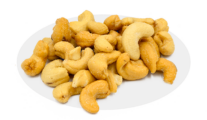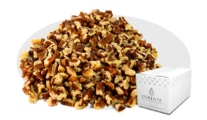Written By Sam Henselijn
How To Make Nut Flours At Home. Nut flours are made from nuts that have been ground into a fine consistency. You can use most nuts for this, including almond, hazelnut, macadamia, pecans, walnuts, etc. Any of these will produce a healthy and delicious flour that can be used in several ways, from baked goods to savory cooking.
Cooking with nut flours, whether you do it because of dietary restrictions, health reasons, or simply because you enjoy the taste, is an excellent alternative to cooking with grain flour. They serve as a gluten-free, high protein alternative to traditional wheat flour, and add moistness, heftiness, plus a rich, nutty taste to your dishes!

While all around great to have around, nut flours can be pretty expensive. Thankfully, making your own nut flour from scratch is easier than you probably think. Plus, besides saving you money, this way you can also guarantee the end product is fresh and doesn’t contain any additives or unnecessary ingredients…
Follow the steps below to learn how to make your own nut flours at home.
Grinding the Nuts
First, you need to choose which nut flour to use. Some of the most common nuts used to make nut flour are almonds and cashews, but each of these different nuts will give your recipes a slightly different texture and taste.
You can use a nut grinder, high power blender, or food processor to make your nut flour. When using a food processor, make sure that both the bowl and blade are dry and cool to the touch, and the nuts are room temperature.
Put 1/2 cup of your nuts into the grinder or food processor at a time. Pulse the nuts for 5 second intervals, they’ll quickly go from looking like coarse breadcrumbs to resembling sand. The entire process of grinding nuts in a food processor takes around 2-3 minutes.
Be careful not to over-blend your nuts or they’ll turn into nut butter instead of nut flour.Use a sifter to put the ground nuts through and discard any large pieces. Repeat these steps until all your nuts are ground.
How To Make Nut Flours At Home
The Difference Between Almond Flour and Almond Meal
Almond flour is probably the most popular nut flour out there, but there is a difference between almond flour and almond meal. Almond meal is made by pulverizing unsalted almonds with their skins on. Blanched almond flour, or simply almond flour, results from processing blanched almonds, which have had their skins removed. They can typically be used interchangeably unless stated otherwise in the recipe.
Nutrition
Nut flours are naturally gluten free, and high in fat and fibre. Most nuts are also low in carbohydrate, making nut flours a great alternative for people on keto or other low-carb diets.
Almond flour is a great source of manganese, and also rich in several antioxidants and vitamin E, which can help reduce the risk of cancer, diabetes, and heart disease.
Pecans also produce a great flour alternative. These nuts pack a punch of protein, fiber, and healthy fats! They’re also a great source of magnesium, calcium, thiamin, manganese and polyphenols.
Storage
Homemade nut flour has a shorter lifespan. It doesn’t have any preservatives, so it’s best to make small batches at a time.
Keep any nut flour in an airtight container and store it in the refrigerator for 1-2 weeks. Store in the freezer to extend their storage life. When you are ready to use it, measure the amount you need and let it sit on the counter for 15 minutes.
How to use nut flours
- Almond flour can be used for regular flour. One to one in baking recipes, but the final outcome will be different both in taste and texture. To compensate for the denser texture, use a little extra leavening in your baking recipes.
- You can use nut flours in savory cooking too! Try coating meat and vegetables in place of breadcrumbs. For frying or baking, or sprinkling over soups, stews and pasta dishes to make a crunchy topping.
- Nut flours can also be a great substitute for breadcrumbs in meatloaves or meatballs.
- Nut flours can be used to make cookies, muffins, cakes, pancakes, and pizza crusts!
Sam Henselijn Author’s Biography – Meet L’Orenta Nuts CEO
Copyright 2024 L’Orenta Nuts
L’Orenta Nuts proudly holds the SQF food safety certification, symbolizing our unwavering dedication to upholding the highest standards of food safety and quality. This certification guarantees that our products undergo rigorous scrutiny, ensuring transparency, traceability, and adherence to global food safety regulations for the utmost consumer confidence.
L’Orenta Nuts has the HACCP (Hazard Analysis and Critical Control Points) certification is a systematic approach to identifying, evaluating, and controlling food safety hazards. It ensures that food products are produced and handled in a manner that minimizes risks and complies with safety standards.
Our GMP (Good Manufacturing Practices) certification ensures that a manufacturing facility adheres to comprehensive quality and safety standards while producing pharmaceuticals, food, and other consumer goods, promoting consistency, quality, and compliance with regulatory requirements.
L’Orenta is an FDA-approved manufacturing facility and has met the rigorous standards set by the U.S. Food and Drug Administration. It demonstrates compliance with regulations, ensuring the production of safe and high-quality food products.
























